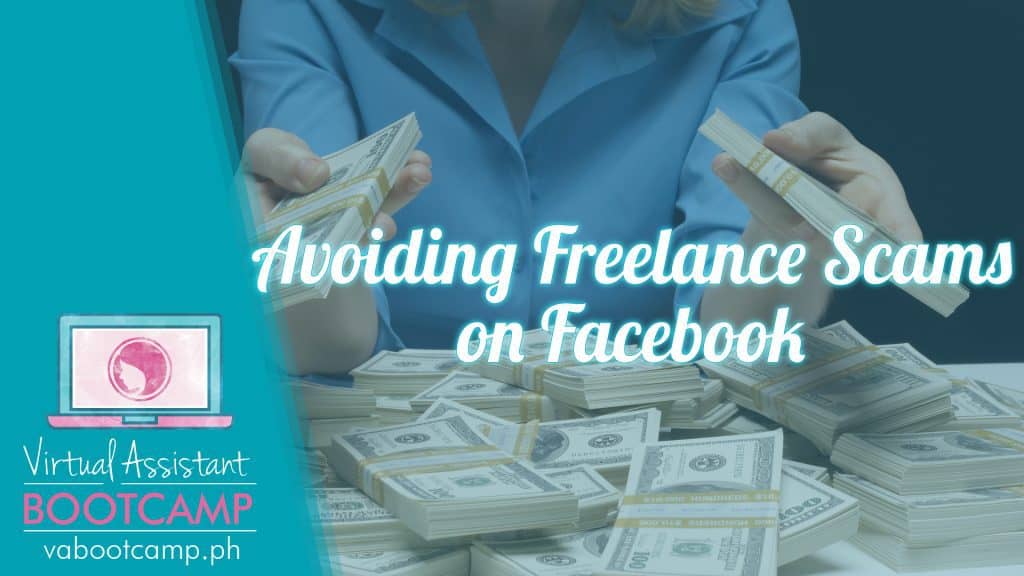Menu

A lot of people confuse ‘working from home’ with multi-level marketing (MLMs) and quick-rich schemes. I blame misleading agents and social media posts for this.
In this blog post, we’re going to address this issue so that aspiring and newbie freelancers won’t mix these things up.
Welcome to Part 3 of our How to Avoid Freelance Scams blog series. If you haven't read Parts 1 & 2 yet, please check them out first:
Part 1: Golden Rules on How to Avoid Freelancing Scams
Part 2: How to Avoid Scams on Upwork
Many MLMs or networking agents have been disguising their offers as ‘work from home jobs’ on Facebook. This tactic has become so rampant, we have to keep filtering them out of our freelancing group.
I’m not saying that networking companies are scams. In fact, some of them offer decent products and are registered businesses.
I just don’t like how some of their agents use deceitful tactics to recruit members.
They have even shamelessly stolen our freelancing photos and used them as their own.

This photo was originally submitted to FLIP as an entry to our freelancing photo contest.
So freelancers, be very careful when responding to job posts on social media. Not everything that says ‘work-from-home’ is a real, online freelancing opportunity.
Here are some ways to tell that you’re dealing with an MLM or a networking company:
1. They use images of money to grab attention.
Sadly, quick-rich, easy-money posts do capture people’s attention.
But there’s no quick and easy way to succeed online. Online freelancers have to work really hard to provide value to their clients worldwide.
Stay away from posts that look like this:

Be mindful of what you believe online.
This is a very common MLM tactic.
2. Their job offers and/or products are often ambiguous.
One example I see on Facebook is PlanProMatrix.
They brand themselves as an ‘affiliate business’ but they offer data encoding, e-loading, and referral incentives on their website.
They promise to help members start their home-based businesses but in reality, they earn their income from referrals.
They do not get into complete details about their products, but you’ll see them aggressively posting and commenting on different Facebook groups.
When something feels off about an online company, stay away.
3. Your main task is to recruit friends (or friends of friends, friends of friends of friends, etc) to join them.
Most online businesses with no real products get people to ‘sign up’ and earn commissions by recruiting others.
When these recruits also recruit other people, they’ll earn more commissions, and so on. You’ll often hear the terms upline and downline used a lot.
You’ll also notice how their members can get really pushy about joining them. Because if no one gets recruits, no one earns anything.
There’s no real value here, guys - not for you or for the person you’re recruiting. Don’t get yourself or your loved ones entangled in this kind of business.
4. Any job listing claiming to be quick, easy and can be done using a cellphone.
Again, there’s nothing quick and easy about freelancing. And nope, you’ll need a laptop or a desktop to complete legit, online jobs.
If you need a quick refresher on how to start online freelancing, this article should help: Paano Maging Online Freelancer
5. They encourage you to comment ‘How’ or ‘PM me’ to get more details.
If a job post does NOT disclose all the task details but instead, asks you to comment ‘How’ or to send a private message, something’s off.
A legit listing will give you detailed instructions of the tasks and their requirements. It will ask you to send a cover letter to a company email address (not personal ones using Yahoo or Gmail).
Of course, you’ll still find legit companies posting opportunities on social media. Legitimate companies often include details of:
If you want to browse through Facebook job posts, you can check this thread in FLIP. The group’s moderators are very strict about the posts they approve in this group, so feel free to check opportunities there.
But still, don’t forget that the golden rules still apply in ALL the job posts you interact with.
A lot of fishy people online will insist that they send you money through Western Union, MoneyGram, or some unknown service. They even send fake screenshots and proofs of payments!
With PayPal, you can easily verify if a client has sent you money (or not). As long as you make sure to log-in to your PayPal.com account (and not a link someone else tells you to click) – you can see all your transactions and their statuses real-time. If you don't see a payment there, the client didn't send it yet.
Remember why you wanted to go into freelancing?
For most of us, it’s because we wanted FREEDOM.
From ridiculous bosses... office politics... traffic... overdue promotions, and so on...
And if you’re reading this blog, I’m sure you’ve already heard that it’s possible from the freelancer success stories we’ve featured.
With that, let me reiterate that there is NO QUICK AND EASY way to be successful online.
The sad truth why most people get deceived online is because they’re so fed up and just want the quickest way to earn money.
I don’t blame you for feeling that way. Trust me, I’ve been there too.
But I urge you to hang in there.
Just read a bit more, learn a little more, and get to know the legit clients in this wonderful freelancing world.
If you’re still confused where to start, check out this helpful post: Paano Maging Online Freelancer
Or our 5-day FREE course on How to Be a Virtual Assistant.
If you have any questions, please type them in the comments below and I’ll do my best to reply to each one, or even answer them in my next blog posts.
Happy learning! 🙂